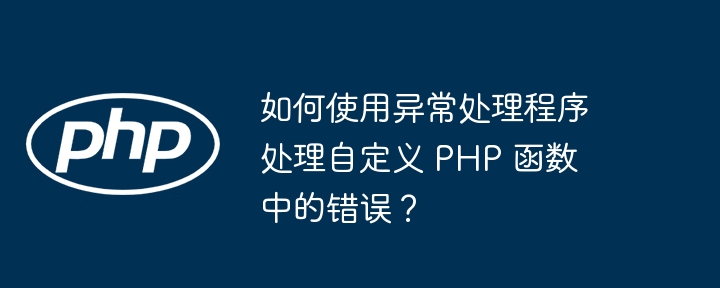 Backend Development
Backend Development
 PHP Tutorial
PHP Tutorial
 How to use exception handlers to handle errors in custom PHP functions?
How to use exception handlers to handle errors in custom PHP functions?
How to use exception handlers to handle errors in custom PHP functions?
Using exception handlers to handle errors in custom PHP functions can improve the maintainability of your code. Here are the steps: Define a custom function that throws an exception. Register an exception handler using set_exception_handler(). Use try-catch blocks to call functions and catch errors. A practical example demonstrates handling divide-by-zero errors.

How to use exception handlers to handle errors in custom PHP functions
Overview
Exception handling is an effective way to handle errors and exceptions, which can improve the readability and maintainability of the code. In PHP, exception handlers allow you to specify code to be executed when an error occurs in your custom function.
Steps
- Define custom function
function divide($num1, $num2)
{
if ($num2 == 0) {
throw new Exception("Division by zero is undefined.");
}
return $num1 / $num2;
}- Register exception Handler
Exception handlers can be registered at the top of the script or at the function call:
set_exception_handler(function ($exception) {
echo "Error: " . $exception->getMessage() . "\n";
});- Call the function and handle the error
Use try-catch block to call the function and catch any errors:
try {
$result = divide(10, 0);
} catch (Exception $e) {
echo "Division by zero error: " . $e->getMessage() . "\n";
}Practical case
The following example Demonstrates the use of an exception handler to handle divide-by-zero errors in a custom function:
Code snippet:
Running result:
Division by zero error: Division by zero is undefined.
The above is the detailed content of How to use exception handlers to handle errors in custom PHP functions?. For more information, please follow other related articles on the PHP Chinese website!

Hot AI Tools

Undresser.AI Undress
AI-powered app for creating realistic nude photos

AI Clothes Remover
Online AI tool for removing clothes from photos.

Undress AI Tool
Undress images for free

Clothoff.io
AI clothes remover

AI Hentai Generator
Generate AI Hentai for free.

Hot Article

Hot Tools

Notepad++7.3.1
Easy-to-use and free code editor

SublimeText3 Chinese version
Chinese version, very easy to use

Zend Studio 13.0.1
Powerful PHP integrated development environment

Dreamweaver CS6
Visual web development tools

SublimeText3 Mac version
God-level code editing software (SublimeText3)

Hot Topics
 CakePHP Project Configuration
Sep 10, 2024 pm 05:25 PM
CakePHP Project Configuration
Sep 10, 2024 pm 05:25 PM
In this chapter, we will understand the Environment Variables, General Configuration, Database Configuration and Email Configuration in CakePHP.
 PHP 8.4 Installation and Upgrade guide for Ubuntu and Debian
Dec 24, 2024 pm 04:42 PM
PHP 8.4 Installation and Upgrade guide for Ubuntu and Debian
Dec 24, 2024 pm 04:42 PM
PHP 8.4 brings several new features, security improvements, and performance improvements with healthy amounts of feature deprecations and removals. This guide explains how to install PHP 8.4 or upgrade to PHP 8.4 on Ubuntu, Debian, or their derivati
 CakePHP Date and Time
Sep 10, 2024 pm 05:27 PM
CakePHP Date and Time
Sep 10, 2024 pm 05:27 PM
To work with date and time in cakephp4, we are going to make use of the available FrozenTime class.
 CakePHP File upload
Sep 10, 2024 pm 05:27 PM
CakePHP File upload
Sep 10, 2024 pm 05:27 PM
To work on file upload we are going to use the form helper. Here, is an example for file upload.
 CakePHP Routing
Sep 10, 2024 pm 05:25 PM
CakePHP Routing
Sep 10, 2024 pm 05:25 PM
In this chapter, we are going to learn the following topics related to routing ?
 Discuss CakePHP
Sep 10, 2024 pm 05:28 PM
Discuss CakePHP
Sep 10, 2024 pm 05:28 PM
CakePHP is an open-source framework for PHP. It is intended to make developing, deploying and maintaining applications much easier. CakePHP is based on a MVC-like architecture that is both powerful and easy to grasp. Models, Views, and Controllers gu
 CakePHP Creating Validators
Sep 10, 2024 pm 05:26 PM
CakePHP Creating Validators
Sep 10, 2024 pm 05:26 PM
Validator can be created by adding the following two lines in the controller.
 How To Set Up Visual Studio Code (VS Code) for PHP Development
Dec 20, 2024 am 11:31 AM
How To Set Up Visual Studio Code (VS Code) for PHP Development
Dec 20, 2024 am 11:31 AM
Visual Studio Code, also known as VS Code, is a free source code editor — or integrated development environment (IDE) — available for all major operating systems. With a large collection of extensions for many programming languages, VS Code can be c





